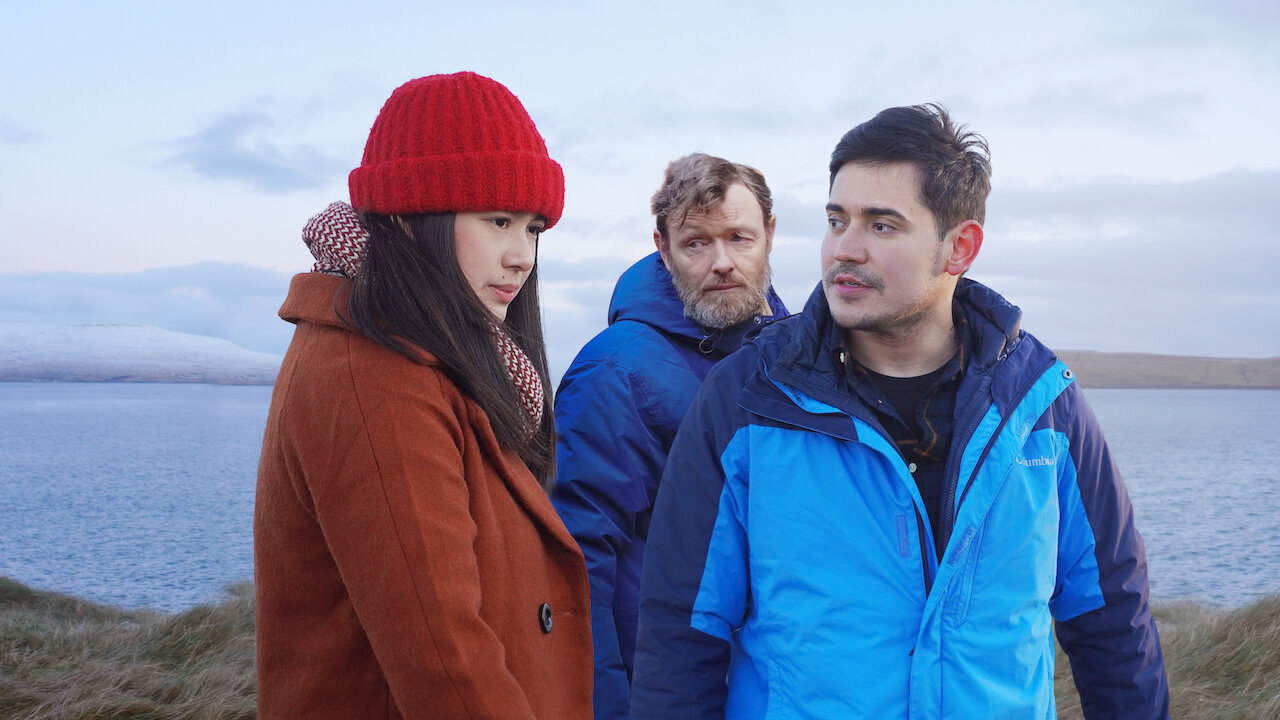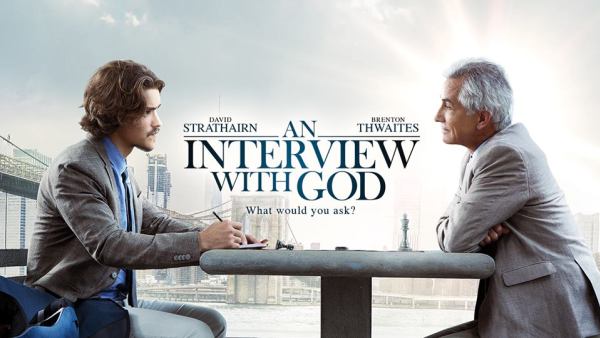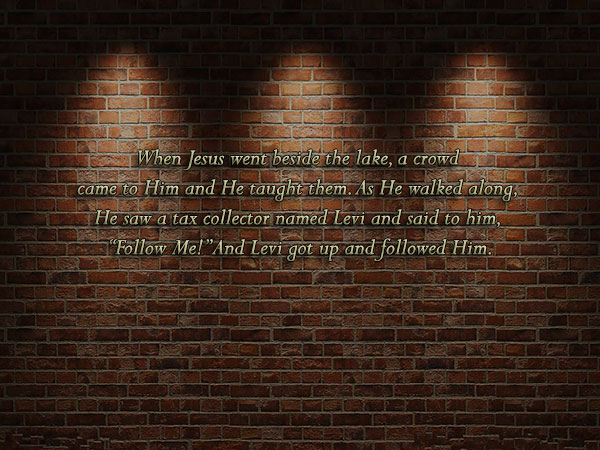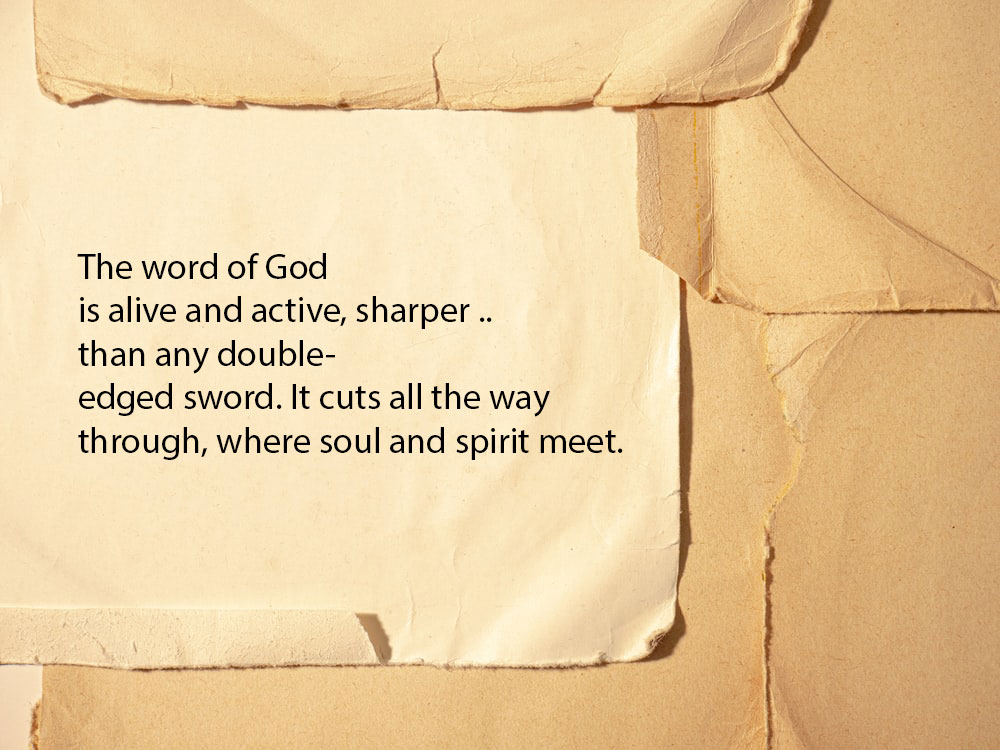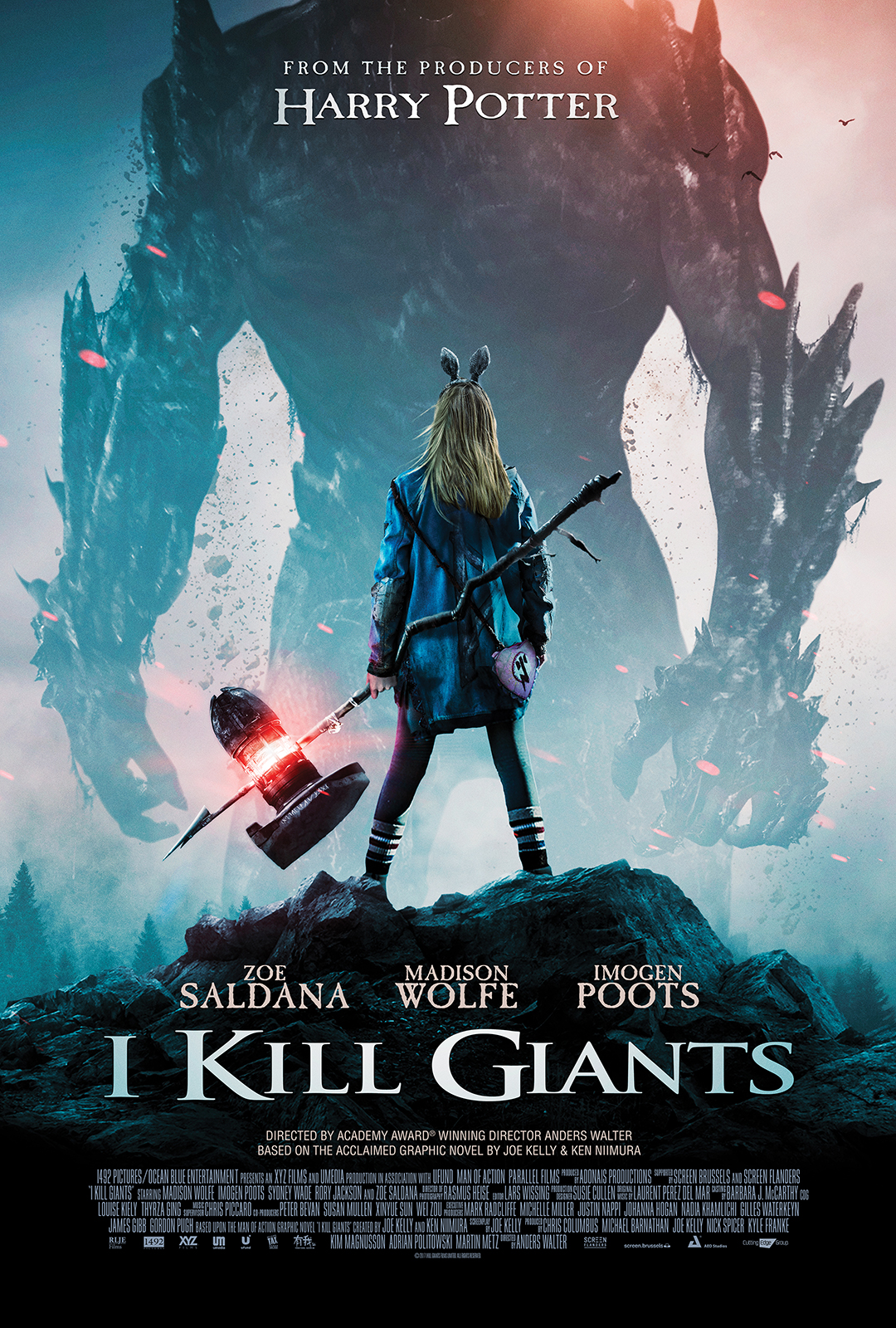
a FILM REVIEW by Meanne M. Mijares
Cast: Madison Wolfe as Barbara Thorson, Imogen Poots as Karen Thorson, Sydney Wade as Sophia, Rory Jackson as Taylor, Zoe Saldana as Mrs. Mollé, Noel Clarke as Mr. Mollé, Jennifer Ehle as Mrs. Thorson, Ciara O’Callaghan as Theresa Tuzzo
Directed by Anders Walter
Produced by Chris Columbus Michael Barnathan Joe Kelly
Based on the graphic novel I Kill Giants by Joe Kelly and Ken Nimuna
Distributed by RLJE Films
Rating: PG
Genre: Fantasy/Drama
THE STORY
I Kill Giants chronicle the life of young Barbara Thorson (Madison Wolfe), an outsider at her school who spends most of her time engrossed on the task of killing giants that terrorize her little town. Barbara has created an elaborate system of protection zones around the town that she must attentively check on lest they find the middle ground, in addition to keeping an eye out for traces of a giant’s appearance. Her focus on giants and little else – with the exception of Dungeons and Dragons and some old tapes of baseball games – leaves Barbara with no time for her older sister Karen (Imogen Poots) or to deal with what’s going on with her family. As her sister (Imogen Poots) struggles to keep her head above water caring for Barbara and their brother in a house seemingly without parents.
Barbara Thorson (Madison Wolfe) is the lifeblood of this magical film adapted from the graphic novel of the same name by Ken Niimura and Joe Kelly, the latter of whom also writes the screenplay., Barbara goes on her usual rounds to protect the town from evil giants makes a new friend, Sophia (Syndey Wade)
That begins to change when Barbara befriends a new girl in town, Sophia (Sydney Wade), to whom she explains the history and dangers of giants. Sophia has recently moved from Leeds, England to this beautiful coastal town, and instantly takes to Barbara, though our heroine is so used to being mocked by her peers that she’s slow to warm up to new faces. Sophia begins to paddle into the giant killing trade alongside Barbara, even as a bully at school named Taylor (Rory Jackson) intimidates them both.
The other new person in her life is the school psychologist, played with warmth and palpable frustration by Zoe Saldana. Mrs. Mollé knows there’s something more to Barbara’s magical world, and will do anything to reach what she sees as a troubled, isolated young student. As the impending giant attack draws closer, everything in Barbara’s world comes to a head, forcing her to be braver than she ever thought possible. Additionally, the school psychologist endeavors to understand Barbara, though their relationship is edgy at best. As a specifically mean giant creeps up the town, Barbara is forced to face up to what she’s truly afraid of – and with her legendary hammer Kovaleski on the fritz, it remains to be seen if Barbara is ready to confront the giant.
The film drives a fantastical tale around its young heroine as a focal point for a much more substantiated and melodramatic narrative. It feature a child lead who must face the notion of death at a tender age, and deals with such a terrifying thought through huge supernatural beings.
THEME
In terms of its themes, I Kill Giants tackles the concept of death with boldness, depicting Barbara as an incredibly complex young person with conflicting moments of fascination and avoidance of death. The result is a difficult, flawed and wholly human protagonist, carried well by Wolfe. With Barbara at the center of I Kill Giants, Wolfe is tasked with portraying a character that has a great deal of depth below an at-times unlikable outward demeanor. However, Wolfe excels in bringing Barbara to life, and plays effectively against the more fantastic aspects of the story. The combination of magical realism in the giants and Barbara’s protection wards with the dramatic elements of her daily life offer a compelling look at how someone does – or, as the case may be, does not – deal with a concept as difficult as death.
Though I Kill Giants is ultimately an uplifting story about a young protagonist dealing with death and grief, the film is perhaps not best suited to very young viewers. One of the strengths of I Kill Giants is its balance of candor and evasion of its main themes – however, its directness is portrayed at times with chilling or horrible visuals (a particular scene in which Barbara and Sophia stumble upon road kill comes to my mind). These moments, along with the density of the film’s depiction of death, prove to make I Kill Giants a more grown-up film than its young teenage protagonist proposes. But with the Harry Potter franchise’s Chris Columbus behind the film as a producer and a magical score from composer Laurent Perez Del Mar, I Kill Giants does effectively encapsulates the childlike wonder and imagination of its central character. So, while I Kill Giants may not be appropriate for young viewers, it’s certainly well suited for viewers who are young at heart.
SPIRITUAL CONTENT
The film took me back to the story of King David and Goliath, one of my favorite Bible stories while growing up. Well, King David isn’t the only one who had a giant who needed to come down. Here are seven “goliaths” God wants us to knock down since we all have the power to overcome.
1) Insecurity
Lack of confidence in one’s self is a terrible way to live and God wants you to be confident in your ability in Him. We use Philippians 4:13 to stone down the giant of self-doubt. According to the film, you are stronger than you think. Yes because we are in Christ and He is in us.
2) Approval of Others
When you put your faith in man instead of God, it opens your life up to a lot of disappointment and a world of failed expectations. People will fail you that’s a known fact, but God won’t. “Fearing people is a dangerous trap, but trusting the LORD means safety.” – Proverbs 29:25
3) Blaming
The gift of free will, prevents our ability to blame others. We can’t control situations and conditions but we can lay down our reaction to them. Take ownership of your decisions and watch God transform your life. Deuteronomy 30:19 says “I have set before you life and death, blessings and curses. Choose life, so that you and your children may live.”
4) Pity Parties
God doesn’t respond to need, He responds to faith. Floundering in self-pity is another form of idolatry and guess who’s being worshipped…you and your situation. This type of behavior thwarts the wisdom of God from having an impact because it’s continually blocked by the “poor-me mindset.” Instead we should heed the words of 1 Thessalonians…”Give thanks in all circumstances; for this is God’s will for you in Christ Jesus.
5) Lazy Thinking
The thought life is one of the most powerful gifts God has given us, so much so that the Bible tells us that we become what we continually think about. Therefore, we should train our thoughts to be governed by God through a constant internal dialogue with Him, not conforming to whatever the world dumps in. In Philippians 4:8 Paul exhorts us to develop a Christian thought life. His words should not be divorced from the context. Practicing verse 8 is important if we want to develop and maintain healthy relationships (4:2-3, 5). A Christian thought life is also integral to a life of joy (4:4) and peace (4:6-7) in every situation. Since our thoughts form the basis for our behavior, a godly thought life is also essential for the obedience to which Paul exhorts us in verse 9. Clearly, Paul’s thought life was at the heart of the contentment he had learned in every situation (4:10-12). So Paul is telling us the way to be whole people in our relationships with God, with one another, and within ourselves. The Christian’s thought life should be focused on the great truths of scripture.
6) Fear
The spirit that God created for us is one of power, love and a sound mind. When we operate in fear, we essentially defect our original design and function in the distorted realm of the enemy. 2 Timothy 1:7 New King James Version (NKJV) says: “For God has not given us a spirit of fear, but of power and of love and of a sound mind.”
7) Selfishness
The giant that is most difficult to takedown is our very own selves. Living a life that is closed and only concerned about survival is not God’s perfect will for His children. Greatness in God’s Kingdom is based on servant hood. Enough of the selfies! Put “self on the shelf” and live a life of love and serving others. Selfishness or empty conceit is often expressed by building up oneself while tearing down someone else. It is one of the “works of the flesh” according to Galatians 5:20. It leads to “disorder and every evil practice” (James 3:16). Selfishness caused the children of Israel to “willfully put God to the test by demanding the food they craved” (Psalm 78:18). Selfishness caused the rich young ruler to turn his back on Jesus (Matthew 19:21-22). Selfishness ruins friendships (Proverbs 18:1), hinders prayer (James 4:3), and is the product of earthly wisdom (James 3:13-14). The opposite of selfishness is also found in Philippians 2: being united with Christ, having tenderness and compassion, and “being like-minded, having the same love, being one in spirit and purpose” (Philippians 2:2).
8) Hate- We need to do what our Lord Jesus hates by avoiding what the world loves. In John 15:18 Jesus declares, “If the world hates you, you know that it has hated Me before it hated you.” The particular form of the word “if” assumes something is true. Jesus is saying, “If the world hates you—and it does.” There is a certainty in Jesus’ words: “You will be hated! You can count on it!” Jesus then reminds His disciples that the world hated Him first. Jesus is commanding His disciples to remember that He was hated from the time of His birth to the time of His death. Think about this: Jesus’ life began with King Herod attempting to kill Him. Jesus’ life ended in a death of sheer hatred. He was crucified at the wishes of His own people—the Jews. Thus, we must not be surprised by hatred.6 The word “hate” is used seven times in the first eight verses (15:18-25).7 It is the dominant word in this passage. Jesus’ point is: Friendship with Me comes with a hefty price tag—the world’s hatred. Jesus wants you to be forewarned. In some circles, you will be public enemy number one.
There are three main reasons why the world hates Christians. First, we are no longer identified with the world. In 15:19 Jesus says, “If you were of the world [and you’re not], the world would love its own; but because you are not of the world, but I chose you out of the world, because of this the world hates you.” Jesus insists that His disciples are no longer “of the world.” They may be “in the world,” but they are not “of the world.” Those who are “of the world” are loved by the world. But the world’s love is evanescent. You can be “loved” one moment and rejected the next.
STRONG POINTS
The film contains larger than life visuals that contrast well with the grounded setting of Barbara’s hometown, and makes the film great for a dramatic viewing. I Kill Giants is an enchanting, heart-rending movie that adds to the legacy of magical realism and will fill your heart to bursting for its heroine. A middle school girl focused on the larger than life world of her imagination, Barbara takes on bullies at school and once the bell rings, ancient evil in the form of giants.
Madison Wolfe carries this film excellently, taking the lion’s share of the screen time as the enigmatic beating heart at the center of this modern fable. Like any good fairy tale, much of it happens in the woods, there are magical creatures, and darkness lurks behind every corner. Barbara is the kind of girl who spends so much time outside that she has dirt encrusted in her cuticles that no amount of scrubbing can clean, the kind of girl who wears tattered bunny ears throughout the film.
Barbara calls to mind a common childhood love of mixing magic potions, creating secret lairs, and vivid (not so?) imaginary worlds. Anyone who has made their own lean-to in their backyard or mixed glitter and shampoo into the kind of essence that gathers lectures from grown-ups will find themselves transported back to a younger age as Barbara brings us into her private, lonely world.
Barbara isn’t east to get to know. By her own admission, she is a little mean to people who she thinks are dumb, which is just about everyone. She isn’t easy to spend time with, so most people, like her brother and classmates, don’t bother. Aside from dressing funny and loving Dungeons & Dragons, from the perspective of everyone around her, Barbara seems to have two feet still firmly planted in the weird, immature, imaginative world of childhood.
The progressively more precarious realities of Barbara’s world are shown in sharp relief, particularly in the reactions of those who love her most. Her sister is just barely holding everything together, which Poots succeeds to play without turning the character into either a nag or a martyr. She knows something is off with Barbara, but there’s never enough time in the day to break through Barbara’s toughened exterior.
So much is unspoken in I Kill Giants, and the weight of transporting it falls largely on Saldana and the two young leads. All three excel here, drawing the audience in to not only want to solve this puzzle box of a film, but to feel Barbara’s anguish and theirs so severely. Sophia is eager to throw herself into Barbara’s world, yet she’s brave enough to tell her new friend when this world scares her. Sophia’s doubt creep up to come between them; Barbara wants Sophia to be brave, but Sophia wants Barbara to be alright.
Barbara’s duty as protector is colossal, and she dedicates herself exclusively to it – perhaps too much. She does daily “rounds,” checking up on the hidden hieroglyphs she has painted onto abandoned trains and scratched into corners, the charms and magical trip wires tucked just out of site. She constructs physical tests and tracks conditions in her logbook, all almost as elaborate as the world they support.
It’s the idea of “just out of sight” that I Kill Giants plays with most effectively. So many of our genre heroes have to keep their heroics a secret, making themselves look foolish or even selfish. But what does that look like while you’re still waiting to be vindicated? What does it mean to be brave, and which monsters are the hardest to vanquish?
WEAK POINTS
The only truly unbelievable part of this film is the idea that it’s set in New Jersey. Beautiful shots of the Irish coast and the Belgian countryside add to the rich visual landscape of Barbara’s town. This helps anchor the giants, past and present, believably in our world. I Kill Giants perfectly capture the concept of magical realism: it concurrently subscribes into the world of the enchanted while being totally grounded in reality. The beautiful animation and effects make this brand of magical realism easy to relax into, even as spectators search for what’s going on in Barbara’s life, and whether the giants she sees are real after all.
The supporting characters of I Kill Giants work to build out the world of Barbara – particularly Wade’s Sophia, Saldana’s Mrs. Mollé, and Poots’ Karen. Viewers are given very little insight into their lives beyond their relationships with Barbara, though each character does have moments of their own. But that limited insight into these supporting characters is a choice to effectively position the viewer as seeing the world through Barbara’s view – and her view is restricted by her focus on giants and her avoidance of certain other aspects of her life. So, while I Kill Giants doesn’t offer its supporting stars much to work with beyond their characters’ relationships to Barbara – which is somewhat of a missed opportunity in the case of Saldana and Poots – they work well with Wolfe and add a consciously uncharted profundity to the story.
VIOLENT CONTENT AND CRASS WORDS
I see Barbara answering back at her older sister Karen, slapping Mrs. Molle and punching Sophia on the face and heard some offensive crass words by Taylor and how Barbara sarcastically deals with their school principal.
CONCLUSION
Summing it up, I Kill Giants tells a wonderfully toned story of a young heroine being forced to face the concept of death, with a great deal of grotesque essentials as an entry point to the gripping storyline. To preserve the mystery I would rather not say much about the climax and ending, with the exception that it’s impossible not to be moved into tears. I Kill Giants show us that though villains come in so many forms, there are heroes in our midst every day and that can be you and me.
Come, let’s slay those giants in the Name of Our Lord Jesus Christ!
All in all, I rate the film 4/5 stars.




